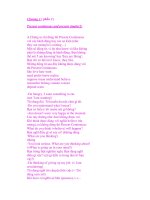present simple continuous
Bạn đang xem bản rút gọn của tài liệu. Xem và tải ngay bản đầy đủ của tài liệu tại đây (188.11 KB, 2 trang )
English grammar: Present simple and continuous tense
Present simple tense
Form
Positive statement: I play, He plays
Negative statement: I do not play (I don't play), He does not play (He doesn't play)
Question: Do you play? Does he play?
Neg. question: Do you not play? (Don't you play?) Does he not play? (Doesn't he play?)
Spelling
We only use -s ending (plays) in the third person singular.
We add -es to the verbs that end in ss, sh, ch, x and o: misses, finishes, watches, mixes, goes.
If the verb ends in a consonant and -y, we change -y into -i and use the -es ending: carry - carries, try tries.
But: play - plays, because this verb ends with a vowel and -y.
The auxiliary verb do is not used to make questions and negative statements with modal verbs and the
verb to be.
Are you a student? Is he in London? I am not at home. He is not happy. Can you sing? Must I come? I
cannot swim. He mustn't stay.
If the wh- pronoun introducing the question (who, which) is the subject of the question, we do not use the
auxiliary verb do.
Who knows you? (who is the subject)
Which cars belong to you? (which cars is the subject)
But: Who do you know? (who is the object)
The negative question normally expresses a surprise.
Doesn't he work?
Use
1. We use the present simple tense for activities that happen again and again (everyday, sometimes,
ever, never).
I sometimes go to school by bike. You don't speak Greek. Do they get up early?
He often travels. She doesn't work. Does she ever help you?
2. We use it for facts that are always true.
Our planet moves round the sun. Lions eat meat.
3. With a future time expression (tomorrow, next week) we use the present simple for planned future
events (timetables).
The train leaves at 8.15. They return tonight.
Present continuous tense
Form
Positive statement: I am playing, You are playing, He is playing
Negative statement: I am not playing (I'm not playing), You are not playing (You aren't playing), He is not
playing (He isn't playing)
Question: Are you playing? Is he playing?
Neg. question: Are you not playing? (Aren't you playing?) Is he not playing? (Isn't he playing?)
The present continuous tense is formed with the verb to be and the present participle (-ing ending). The
negative question normally expresses a surprise: Isn't he working?
Use
1. We use the present continuous for an activity that is happening just now.
I am learning English at the moment. You aren't listening! Why is he sitting here?
Online exercises and grammar rules at www.e-grammar.org/present-simple-continuous
2. We use it for an action happening about this time (today, this week), but not necessarily at the moment
of speaking. It is a temporary activity.
I am in London. I am staying at the hotel. (But just now you can be somewhere else.)
She can't go out. She is writing her essay today. (But she can be having lunch at the moment.)
You can't borrow this book today. Mary is reading it. (But not right now.)
3. With a future time expression (soon, on Monday) we use the present continuous for definite
arrangements in the near future. It is more personal than the present simple tense, because it expresses
the speaker's plan.
I am leaving soon. We are meeting on Monday.
Online exercises and grammar rules at www.e-grammar.org/present-simple-continuous









